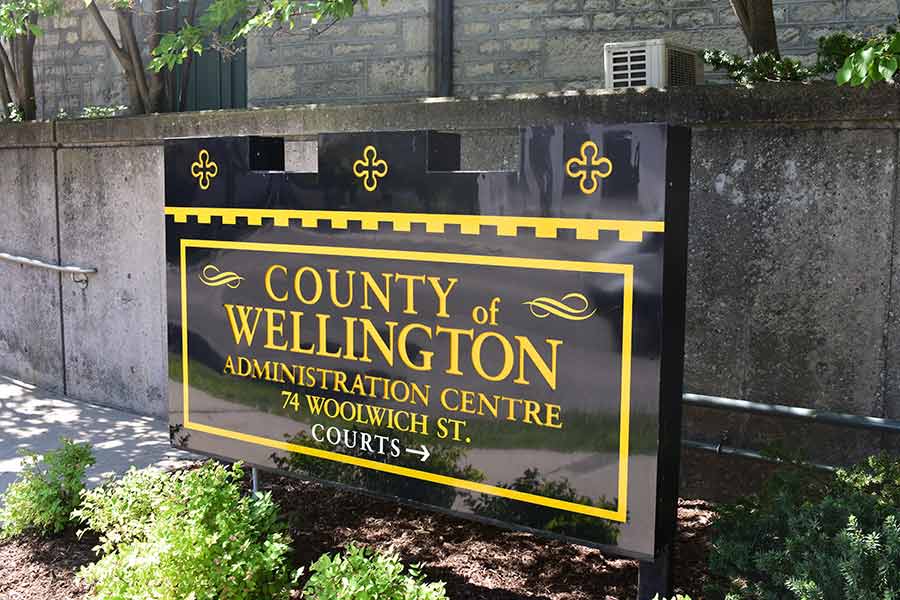GUELPH – Wellington County Police Service Board members and county engineer Don Kudo will delegate to Puslinch council on Nov. 29 in response to years-long concerns about speeding on Lake Road, also known as Wellington Road 32.
Speeding and road safety issues along the 2.5km stretch bending around Puslinch and Little lakes have long dwelled on the minds of some residents in the county’s southern reaches, but they’ve become amplified following a change in the speed limit from 50km/h to 70km/h on a portion of the road.
County council approved the change at a September meeting.
The county’s Roads Master Action Plan, approved last year, included Lake Road in an assessment of 27 county roads in the plan’s speed management corridors.
The study recommended changes to posted speed limits on the road, and recommended a number of road improvements as speed management measures.
The justification was based on principles of keeping speeds consistent and reasonable for the road.
A public meeting in November 2022 followed, where residents expressed bewilderment and opposition to the recommended limit adjustment.
In March, Puslinch council asked the county to consider implementing a pilot program before amending the county’s road speed bylaw, to offer comments on a three-way stop proposed for Travelled Road and Sandy Shore Boulevard, and to comment on a suggested graduated speed option from Townline Road to a residential area.
Kudo wrote to the township the same month stating the county’s roads committee had recommended the county move forward with the bylaw change, and that all-way stops, a pilot, and graduated speed option were not recommended.
Kudo referenced several federal and provincial guidelines the county relied on to justify its decisions.
Letters between the township, police board and county officials have been exchanged throughout the year.
In April, the township resubmitted its March comments, and requested clarification from the police board about how speed changes and enforcement would take place.
Inspector Steve Thomas wrote municipal clerk Courtenay Hoytfox in July, telling Hoytfox the OPP doesn’t give direction on speed changes.
“That is strictly a matter for the municipality of jurisdiction to determine, legislate and post themselves,” Thomas wrote.
The job of the police, the inspector explained, is to enforce laws and help prosecute offences.
Thomas also agreed to provide complaint and speeding data requested by the township.
According to that data, 196 complaints to police had originated within Puslinch as of Oct. 23.
The inspector did not specify what the result of the complaints were, if anything, but most involved erratic or aggressive driving and speeding.
In August, Puslinch council asked Wellington OPP to explain how speed limit changes to the road would impact police response levels and budget.
In a Nov. 2 letter addressed to police board chair Earl Campbell, Thomas wrote that safety impacts should be monitored “as it may affect the frequency and severity of traffic accidents and the workload of police responding to these incidents.”
Thomas noted speed limit changes do not directly affect the budget, which is set by the board and voted on by county council.
“Wellington County OPP allocates resources as operationally required,” the inspector added.
A “Black Cat” speed radar was mounted over 10 days, from Oct. 21 to 31, and measured the speeds of 26,030 vehicles travelling along a portion of Lake Road, between Concession 2 and Townline Road (Wellington Road 33), where the legal speed had been increased.
According to radar data provided by the county, 85 per cent of the vehicles were travelling 79km/h in the zone — below the threshold for additional police enforcement.
Black Cat deployments this year, prior to Oct. 21, did not include Lake Road, according to data provided by the inspector to Puslinch.
More recently, the township wrote to Campbell requesting a delegation to council.
“They’ve actually asked us to come talk about it (the road),” Campbell told the police board last week.
Campbell suggested the delegation could move in to a session closed to the public to talk about things “operational in nature” that “can’t be discussed in public.”
The feedback from Puslinch, Warden Andy Lennox told the board, is like a “canary in the coal mine,” and should be interpreted as a “symbolic message” that the police board can do a better job of explaining what the OPP is doing about traffic concerns.
During the same Nov. 8 board meeting, members also discussed a communication breakdown between the OPP and the seven municipalities the agency serves through a taxpayer-funded contract.
“What we’d like to do with that is give them a public presentation,” Campbell said of the approaching delegation.
“I’m looking at this as a public education opportunity with Puslinch.”




